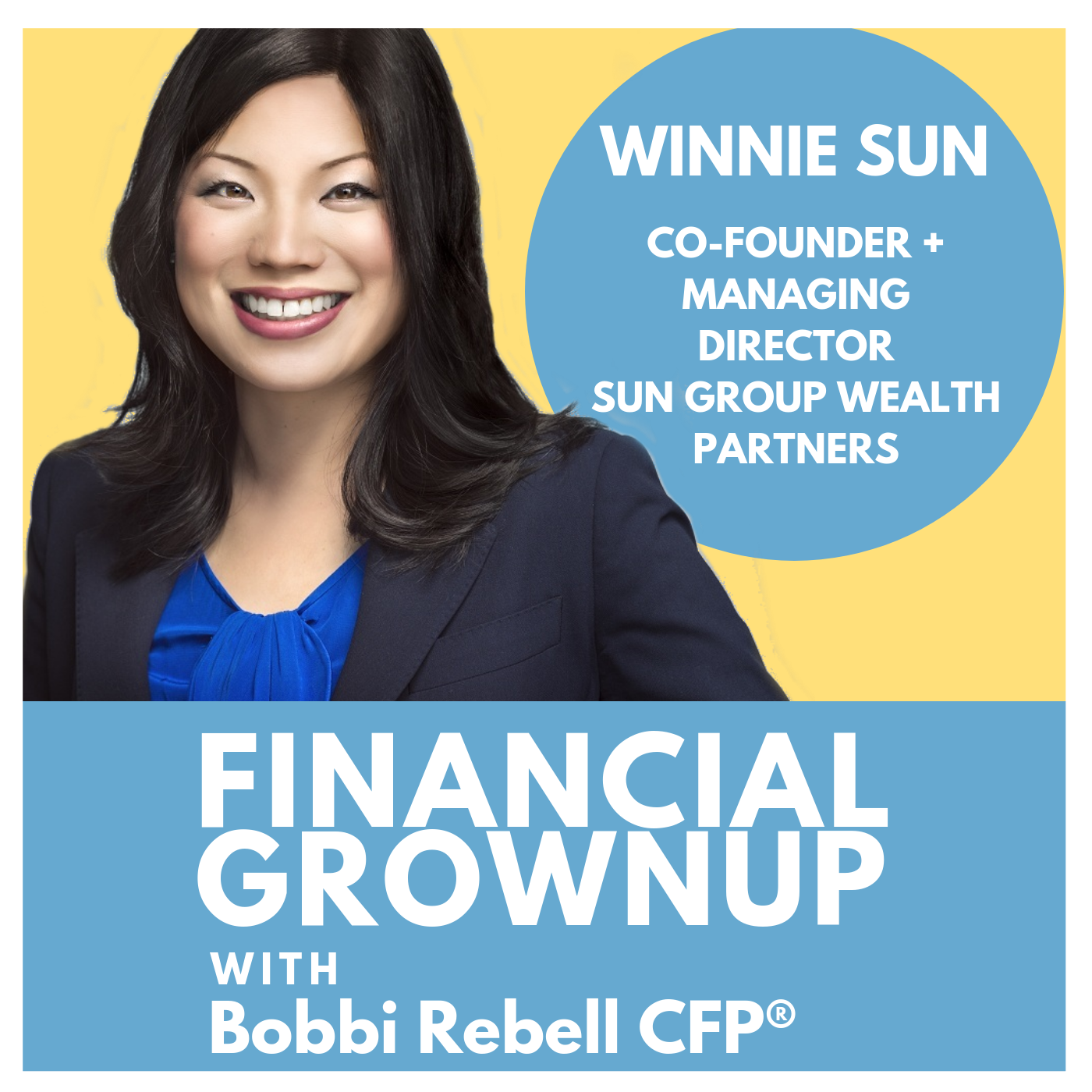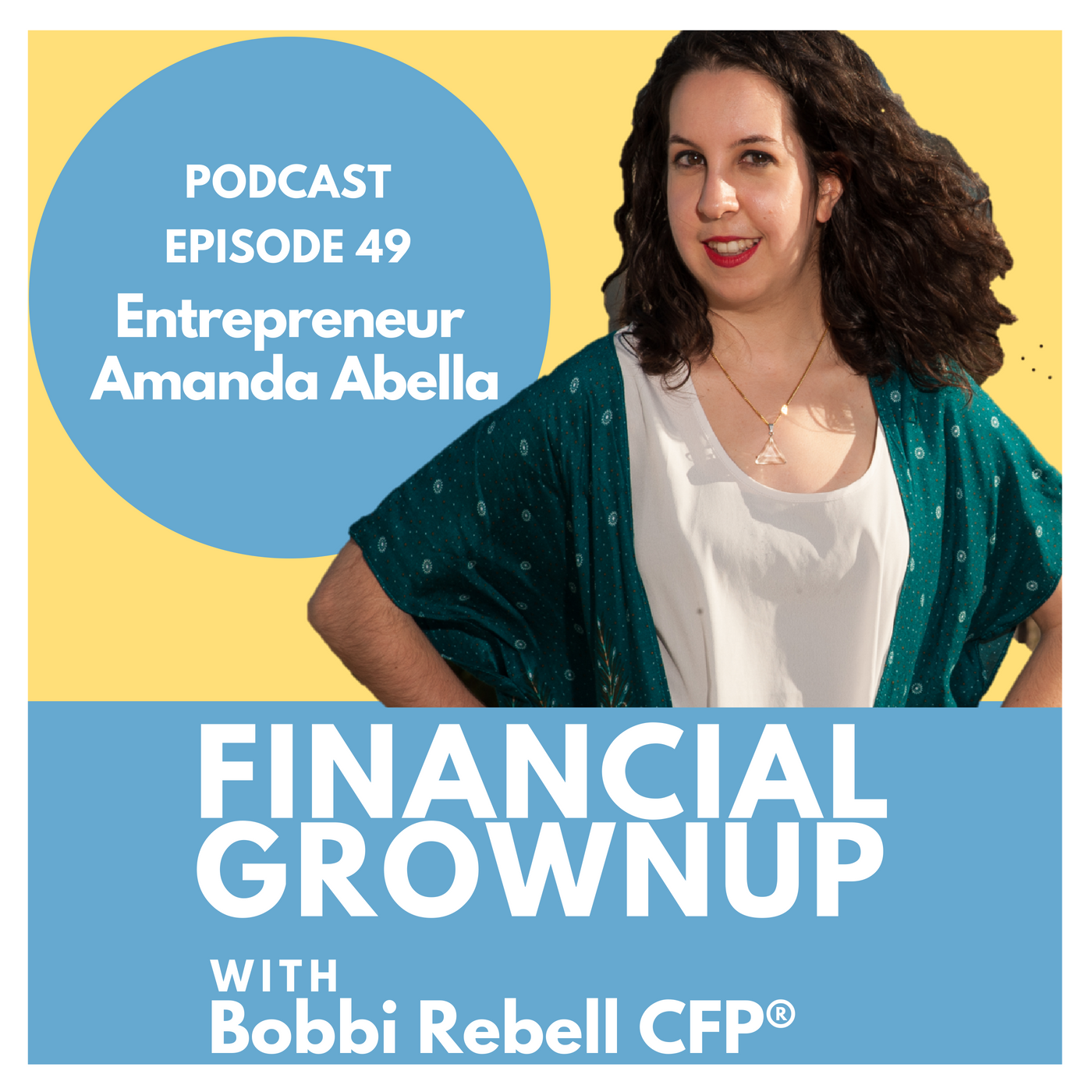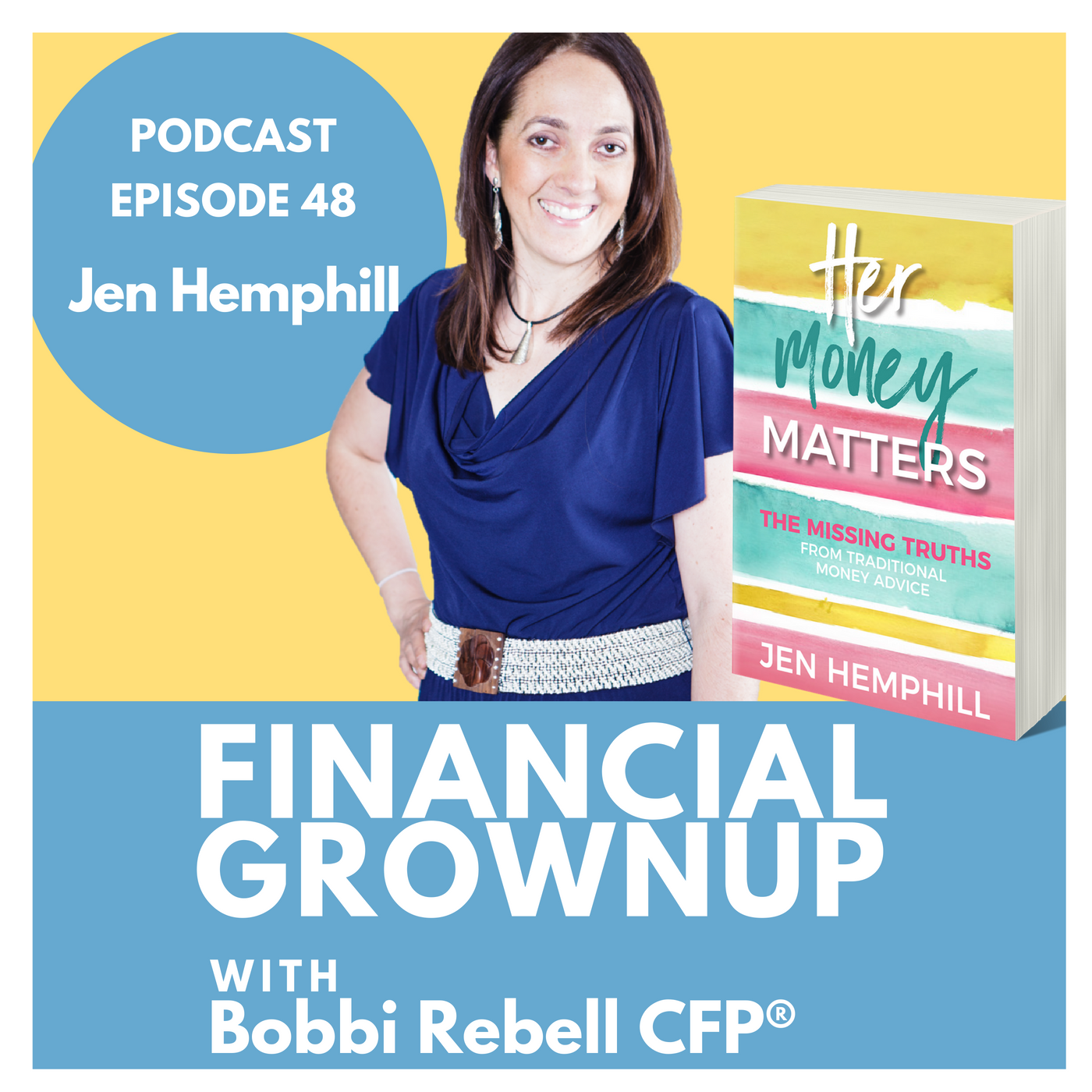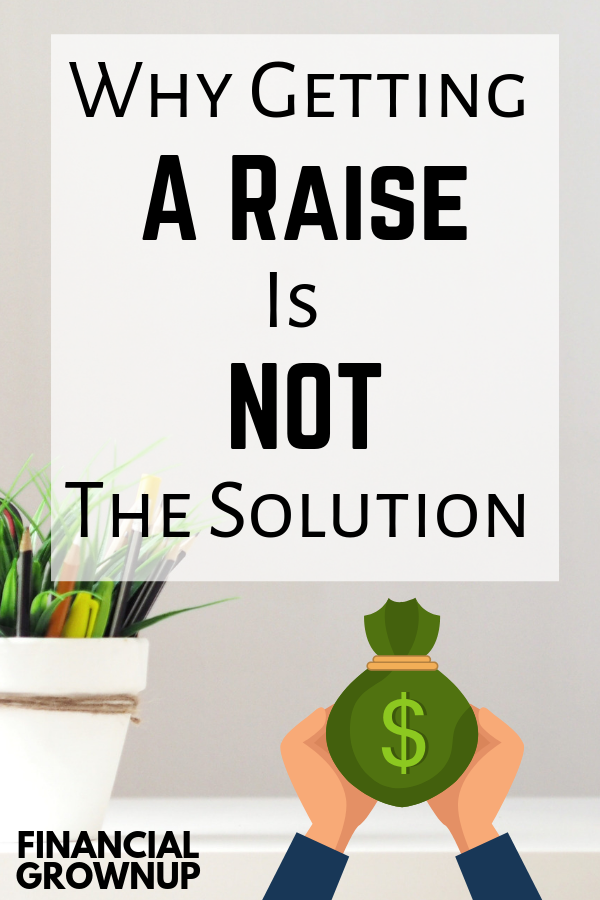Transcription
Bobbi Rebell:
Support for Financial Grownup with Bobbi Rebell and the following message come from Transferwise, the cheaper way to send money abroad, built by the brand behind Skype. Transferwise takes a machete to the hefty fees that come with sending money abroad. Don't get sting by a bad exchange rate, or sneaky fees, join the two billion people who are already saving with Transferwise. Test it out for free at transferwise.come/podcast, or download the app. It is the wise way to send money.
Jen Hemphill:
We lent him the money, or actually gave him the money, and never saw it back. We had debt. We had things that we needed to pay for, things that we needed to purchase, and it also diminished our abilities to have that extra money to pay the debt that we had. Right? It was a very conflicting time.
Bobbi Rebell:
You're listening to Financial Grownup with me, certified financial planner, Bobbi Rebell, author of How To Be A Financial Grownup. You know what? Being a grownup is really hard, especially when it comes to money, but it's okay, we're going to get there together. I'm going to bring you one money story from a financial grownup one lesson, and then my take on how you can make it your own. We got this.
Bobbi Rebell:
Hey, friends. Thanks for joining us for this addition of the Financial Grownup Podcast. Before we get to our amazing guest, I am getting great feedback from all of you about these video promotions that we have been running to support the show, and you're asking me a bunch of questions, so I'm going to answer a few of them here. The first question everyone is asking me is, who is making them for me, who did I hire? I didn't hire anyone, I'm doing them myself. As you guys know, I love to learn new things, different technology, different programs, so I taught myself how to do them, and I'm having a great time.
Bobbi Rebell:
Second question, I keep being asked is, where can I get them made for myself? Well, I am not going to go into the video promotion business, I'm just going to be doing it for Financial Grownup, at least for now, never say never. But in answer to the request, I am going to run a fun contest. For the next month or so, until early July. The first week in July, let's say, we are going to have a competition, where if you see the video promotions for Financial Grownup on social media share them, and whoever shares the most by the first week in July, I will make a video promotion for you. It can be for your business, it can be for an event that's coming up, it can just be for you, it can be a birthday message for a friend, or for your child. Whatever it is, anything reasonable we will make a fun video, and that will be my gift to you guys.
Bobbi Rebell:
Okay. Onto our guest, Jen Hemphill. She is the host of the podcast, Her Money Matters, and the author of a new book by the same name. She is a big believer in helping family, but as a money expert she's also aware that sometimes those asked to give money may not really be in the best position themselves to be the ones giving. What do you do? Here is Her Money Matters, Jen Hemphill ... Jen Hemphill, you are a financial grownup. Welcome to the podcast.
Jen Hemphill:
Thank you so much for having me, Bobbi. I'm excited to be here.
Bobbi Rebell:
I'm excited to hear more about your new book, Her Money Matters, which of course same title as your amazing podcast. Tell us just briefly about it, and we'll talk more about it after your story.
Jen Hemphill:
Sure. Basically, the whole premise of the book is to give more of a holistic approach to personal finance. It's not a book that's going to tell you how to budget, how to get out of debt, but really it's about the missing pieces that a lot of people don't talk about, because all we hear about save more, spend less, and get out of debt, but there's the emotional component of money that I dig a lot into, as well. It's really more the missing pieces, that is really not talked about, in general.
Bobbi Rebell:
Okay. I want to get to your money story, because it has to do a lot with emotion, and the feelings behind when you gift, or lend money to friends, and family, because they can be sometimes the same things, sometimes lending becomes a gift, and you and your husband have very different approaches to it. Tell us about the first time this came up.
Jen Hemphill:
Well, the first time this came up was when we were first married, so this was almost, we'll be married almost 18 years, so this was-
Bobbi Rebell:
Congratulations.
Jen Hemphill:
Our first, oh, thank you. This was our first year in our marriage. We're a military family, we were stationed in Clovis Air Force Base in New Mexico.
Bobbi Rebell:
Wow.
Jen Hemphill:
First year married, we were really still trying to get to know each other, all the newlywed stuff. He got a call from my brother-in-law, and he, my brother-in-law apparently had hit a financial hiccup, and he reached out to his brother for help. Now, I grew up in a household that was very giving. My parents literally grew up in Columbia, and they always helped people. There was always people that would stay at our home, with their family, or some friends. My parents were always givers, even when they didn't have to give. Right?
Bobbi Rebell:
Right.
Jen Hemphill:
I saw that a lot growing up. I knew the financial struggles that they dealt with.
Bobbi Rebell:
We're they dealing with financial struggles because they gave more than they could afford?
Jen Hemphill:
I don't think it was that-
Bobbi Rebell:
Okay.
Jen Hemphill:
That might have been a component, but not all of the components. Right? But it was partial, because I saw them giving, and giving, but they were still trying to get their money stuff together. Right? I saw a lot of that. When I met my husband, one of the things that I love about him is his big heart. He is definitely a giver. He's also a spender.
Bobbi Rebell:
Are you the saver to a spender, by the way?
Jen Hemphill:
Yeah. I'm also a saver.
Bobbi Rebell:
Okay.
Jen Hemphill:
When my brother-in-law reached out to him, we had the conversation, granted again, we were newlyweds. We were trying to figure this thing out, and I can't remember the exact $1.00 amount, but it was more than $500.00.
Bobbi Rebell:
Do you know what kind of situation it was? Was it like a medical operation? Was it a business situation?
Jen Hemphill:
It was behind on bills, collections. Those type of things.
Bobbi Rebell:
Your husband wanted to give him a loan, not a gift a loan?
Jen Hemphill:
Well, he told me a loan, but I knew him.
Bobbi Rebell:
Okay.
Jen Hemphill:
He's a giver. He's not going to expect it back. Where I was more, in my mind, a lender. If you're asking us to lend you money, I'm like, “Okay. You're going to pay us back.” We had debt. We had things that we needed to pay for. Things that we needed to purchase. Literally, at that time we just had our checking account, and our savings account and literally whatever savings went into our savings account, so it was the emergency account, it was when we overspent, it was for big purchases, so everything that was needed that wasn't in our checking account came from the emergency fund. It literally got depleted fast, and it also diminished our abilities to have that extra money to pay the debt that we had. Right? It was a very conflicting time. We had this conversation-
Bobbi Rebell:
[crosstalk 00:07:19]-
Jen Hemphill:
We lent him the money, or actually gave him the money, and then never saw it back.
Bobbi Rebell:
Right. The communication to him, was it, “We are lending you this money,” and he didn't pay it back, or was it, “We are gifting you this money.”
Jen Hemphill:
That's a good question.
Bobbi Rebell:
Good luck with it.
Jen Hemphill:
Because my husband had that conversation with him.
Bobbi Rebell:
Okay. We can't really blame your brother-in-law, because for all we know he was told it was a gift, to be fair.
Jen Hemphill:
Right.
Bobbi Rebell:
What is the lesson, now, 18 years later, you guys happily still together, what is the lesson for our listeners? How would that go now? Would you put your foot down more? What would happen now? What do you think listeners should do? Should they be in a similar situation?
Jen Hemphill:
What we've done is, we included this in our budget, so we set some money aside in a different account, and whenever a family member needs help, we just look at what's in that account, so that way it doesn't really disrupt what we're trying to do financially, and the goals that we're trying to achieve. There's a designated amount that goes in there every month, and currently has just been to help grand mom with some bills, and that's what we work with.
Bobbi Rebell:
It sounds like you've basically come to terms with you're just going to gift it.
Jen Hemphill:
Yeah.
Bobbi Rebell:
None of this lending to family, it doesn't work for you.
Jen Hemphill:
Yes, because then emotionally that's either get upset, “Oh, my gosh, we said we were going to lend it, we never got it back,” so I've learned and grownup.
Bobbi Rebell:
All right.
Jen Hemphill:
Over the years to really, when it comes to family, and friends, and when it deals with money, it's just a gift.
Bobbi Rebell:
But your money tip, your every day money tip is also about separating out funds, that seems to be a common theme for you-
Jen Hemphill:
Yeah.
Bobbi Rebell:
You want to talk about what you do at the grocery store, and how you can use apps for this.
Jen Hemphill:
Yeah. Basically, my money tip is, what we tend to do, let's say we're at the grocery store, and maybe we have some coupons, always strike up a sale, and we're winning. We celebrate, “Yes. I've saved X amount this trip,” but what's important here is, yes, we can celebrate the $20.00, or $10.00, whatever that amount is that we saved, but what are we going to do with that money? Because we're missing out if we're just celebrating it, that we saved that money, but we're not doing anything with it.
Jen Hemphill:
Literally, we have the bank up on our phone. Right? And with so many people having smart phones, you can download your bank app, and whatever that amount of money that you save, transfer it to your savings, or transfer it to pay off some debt. Whatever you deem is best in your situation. But doing that versus just leaving it in there, you know it disappears. That money doesn't have a job, if you will, it just disappears. We've seen it time and again. I know I've experienced it, I'm sure you Bobbi have experienced it yourself.
Bobbi Rebell:
Absolutely. All right. Let's talk more about your book. I'm so excited for you.
Jen Hemphill:
The book, oh, my goodness. The subtitle of the book is, The Missing Truths From Traditional Money Advice, so when we think of traditional money advice, we think about, we really hear, “Save more, spend less, and get out of debt,” but I know from my own experience, I had the financial books, I've read those financial books, I applied what the experts told me, and I was still finding myself stuck. In the book, I really share the lessons that I learned, and what I found out that really kept me stuck after doing all the things right.
Bobbi Rebell:
Awesome. Where can people find you?
Jen Hemphill:
Thank you. You can find all about me at jenhemphill.com. You can find the book there, or you can just go on Amazon, and just type in, Her Money Matters. It also has a companion workbook, because-
Bobbi Rebell:
I love that.
Jen Hemphill:
My audience wanted worksheets, and so they ask, I provide. Each chapter has some questions, some worksheets for you to work with, because essentially I want that to be your cheat sheet. If you're feeling stuck, go back to that work, and go back to that workbook, if you buy the workbook, and refer to that, because that's going to help you get out of that funk that you're feeling.
Bobbi Rebell:
I love that balance between emotional and then very specific practical tools. It's great. Thank you, Jen.
Jen Hemphill:
Thank you, Bobbi.
Bobbi Rebell:
Jen's story was a reminder that family really can be everything, however you define family. We should bend over backwards to help out the people that we care about in our lives. In Jen's case even though her brother-in-law did not pay back that loan, as time went on the asks for financial help from family did go down.
Bobbi Rebell:
Financial Grownup tip, number one, remember it's hard for people to ask you for help, so factor that in when deciding what to do when someone comes to you asking for help. If you are able to help them with their financial troubles, it's usually a better idea to just give them money. If you lend them money, it becomes yet another thing that they need to pay back in a very stressful time. Of course, it can also put stress on your relationship with them. They might avoid you. They might feel like you're judging them, if they buy something. It's better to just keep it clean, give them the money. You know what? Someday you may be in a position where you need their help, and they'll be there for you.
Bobbi Rebell:
Financial Grownup tip, number two. Jen talked about compartmentalizing money. Setting funds aside in different accounts for different purposes. This can be a great way to deliberately save for certain things like a slush fund for relatives that need help. Another thing that I have found can make a lot of sense to do is to put a certain amount of money, or allocate a certain amount of money, maybe on an annual basis to support friends, charities, causes that they care about.
Bobbi Rebell:
That way when people ask for you to support whatever they're involved in, it might be a charity run, or some other fundraising effort, a benefit, you can take the money out of that fund, and if at some point in the year, I mean, you got to be real, here, the funds could run out, you can tell them, “Look, I've completed my giving for the year, but I will send a donation in January.” People understand. Your resources are not unlimited even if your heart is.
Bobbi Rebell:
If you have not hit the subscribe button, please do so that way you won't miss any upcoming episodes of Financial Grownup, and of course you score extra bonus points with us if you rate and review the show. That way other people can learn about it, and be part of our community. Our first listener episode is coming up in June, if you want to be considered to be on an upcoming episode of Financial Grownup, email the money story, and the money tip that you would like to share to info@financialgrownup.com. We are going to see how it goes, and hopefully we'll be doing this once a month.
Bobbi Rebell:
A reminder, if you want to see the promo videos, they are sprinkled throughout our social media, and also we are putting them on our new YouTube channel, which is Financial Grownup, so you can easily just check them out there. You can also see our episodes there, you can listen to them I should say on YouTube as well. In social media, I am on Instagram, at Bobbi Rebell one, on Twitter at Bobbi Rebell, and on Facebook, Bobbi Rebell. Definitely DM me, give me feedback, let me know what you think about the show, let me know guests you want to see, and let me know which promo videos you like the best.
Bobbi Rebell:
Of course, speaking of the promo videos, as I said at the top of the show, if you want a promo video for yourself, share them, retweet them, repost them, and whoever does the most social sharing between now and the beginning, the first week of July, I'm going to make a promo video for you. Jen's story was a great one, all about doing our best for our family, and our friends, and the people that we care about in our lives, such an important topic, so thank you, Jen, for helping us get one step closer to being Financial Grownups ... Financial Grownup with Bobbi Rebell is edited, and produced by Steve Stewart, and is a BRK Media production.












































